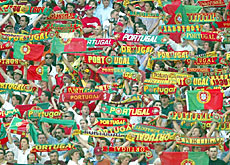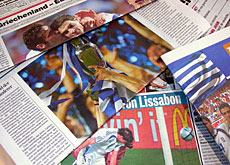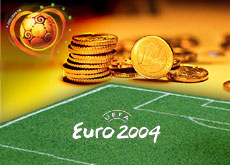Passion is key to Euro 2008 success

Portugal has set the standard and now Switzerland and Austria face a mountain to climb as the joint hosts of the next European football championships in 2008.
swissinfo caught up with Christian Mutschler, Switzerland’s tournament director for Euro 2008, to find out if the Swiss are up to the challenge.
The morning after Greece scored a shock victory against Portugal, the Swiss media were full of praise for the hosts of Euro 2004.
The tabloid, “Blick”, even hailed the tournament as the best of all time.
Mutschler, who was appointed director last year, believes passion is the key to a successful championship.
swissinfo: Euro 2004 has just ended in Portugal. What is your verdict?
Christian Mutschler: It was really a fantastic tournament. I think the people in Portugal, Uefa [European football’s governing body], the government, the police and all the volunteers did a great job.
swissinfo: Do you think there was anything that could be improved upon?
C.M.: There are always things that you can do better, but I think the benchmark that was set for us in Portugal is quite high. There are small details perhaps like stewarding or signposting that could be improved upon.
swissinfo: You have four years to prepare for Euro 2008. What did you learn from the Portuguese?
C.M.: One of the most impressive things was the passion of everybody involved in the tournament. These people did their utmost during the preparations to ensure the best possible event. I think that’s the kind of commitment we need in Switzerland and Austria.
We need local citizens, the authorities, and our suppliers and sponsors to all focus together on the tournament and set aside any personal issues.
swissinfo: Do you believe Switzerland and Austria can reach that level of commitment?
C.M.: I’m sure we can. We‘ve been working on the organisation of the tournament since last September with Fifa [world football’s governing body]. We want all our other partners to become involved so we can deliver a successful tournament.
I also believe that the Swiss have the passion and will get caught up in the 2008 tournament fever.
swissinfo: One of the biggest concerns at these tournaments is security, either because of potential terrorist attacks or hooliganism. Were you convinced by the Portuguese approach to these problems?
C.M.: I think the Portuguese government and the police did an excellent job. I think that the fact that the police were discreet and didn’t show up in large groups helped keep the situation under control. But you always felt secure because you knew the police were there.
Because of this security, the fans from different countries walked to and from the stadiums together. I think this was one of the big success stories of Euro 2004.
swissinfo: What issues do you think Switzerland should focus on as co-organiser of Euro 2008?
C.M.: We have to focus on our stadiums, which are nice but reflect the small size of our countries.
We also have to make sure we keep an eye on the products and services we deliver to our customers and the fans during the tournament. Personally, I would like to see, for example, special Euro 2008 rail passes allowing fans to move around without having to buy extra tickets.
swissinfo: Do you think enthusiasm for the tournament will pick up as it approaches? So far, people don’t seem very excited about the prospect of hosting Euro 2008.
C.M.: If you look back to two years ago when we hosted the under-21 European football championships, people came to see the matches and celebrated this smaller tournament.
Perhaps it takes a little bit longer to get that passion, that party feeling, going in Switzerland. But I’m sure the Swiss know how to party.
swissinfo: But if you look at the stalled Zurich stadium project, it seems that not everybody wants the Euro in their backyard. Isn’t this going to cause you some problems over the next few years?
C.M.: I haven’t heard from anybody in Zurich that they are against the tournament or against football. There may be personal objections against too much traffic or pollution, but we have to take these people seriously and talk to them since they have the right to object.
Looking ahead to the tournament, we should realise that it will probably only take place once in Switzerland in the next 100 years. So we should all be a little more tolerant and open-minded for the Euro. It demands more from most of us than we are used to giving. We have to show that Switzerland is able and proud to host such an event.
swissinfo: And if the stadium project in Zurich falls by the wayside, what is the contingency plan?
C.M.: We had discussions with the local government in Zurich last week and the positive signal is that matches for Euro 2008 will be held in Zurich. There have been talks about alternative solutions, but the plan so far is that Zurich will be a host city for the tournament.
swissinfo-interview: Scott Capper
On December 12, 2002, Austria and Switzerland were chosen to jointly host Euro 2008.
Four stadiums in each country formed the basis of the bid – Basel, Bern, Geneva and Zurich in Switzerland, and Innsbruck, Klagenfurt, Salzburg and Vienna in Austria.
Games in Zurich are, however, under threat because of local opposition against a planned stadium.

In compliance with the JTI standards
More: SWI swissinfo.ch certified by the Journalism Trust Initiative



You can find an overview of ongoing debates with our journalists here . Please join us!
If you want to start a conversation about a topic raised in this article or want to report factual errors, email us at english@swissinfo.ch.